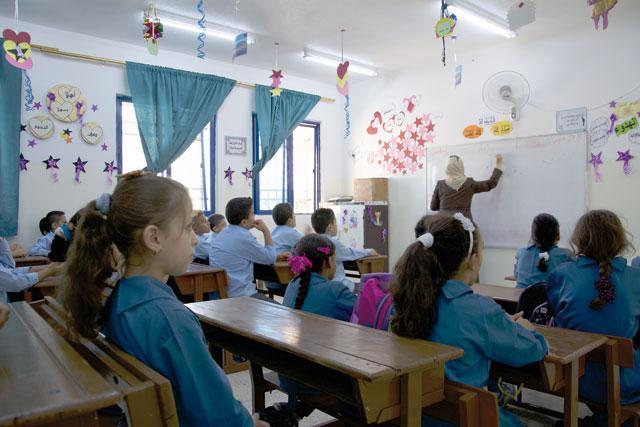You are here
Plan ‘on the anvil’ to transfer private school teachers’ salaries to banks
By Dana Al Emam - Feb 16,2017 - Last updated at Feb 16,2017

Some private schools would pay teachers monthly salaries as low as JD120, according to the Education Ministry (Photo by Amjad Ghsoun)
AMMAN — A new plan under study to transfer salaries of private school teachers to banks has stirred a debate among stakeholders.
The proposed move seeks to spot private schools that violate the minimum wage requirement (JD220), Labour Ministry Spokesperson Mohammad Khatib said on Thursday, adding that many complaints have been reported on the issue, especially in northern governorates.
Describing the proposed move as “the best” proposal to solve the problem, the official said that the plan was discussed at a recent meeting with the Jordan Teachers Association (JTA) and the Private School Owners Association, expecting a final decision next week.
“Some private schools would pay teachers monthly salaries as low as JD120,” he said, explaining that inspecting teachers’ contracts would not help, as some school administrations present “forged contracts” with inflated salaries.
The government has recently raised the minimum monthly wage from JD190 to JD220.
While the ministry’s inspection campaigns penalise violators with fines ranging from JD200 to JD500, the key role falls on the teachers themselves, the spokesperson added.
For his part, JTA Spokesperson Ahmad Hajaya said the plan is suggested to end the “unjust” practices of some private schools against their employees, especially female teachers.
He expected the ministries of labour and education to endorse the suggestion, adding that the JTA has received over 21 complaints from teachers over this issue only in a span of two days.
“Some private schools lack any form of internal administrative structure and try to increase their revenues by cutting down on teachers’ salaries,” he told The Jordan Times.
Meanwhile, Munther Sourani, president of the Private School Owners Association, agreed on the need for private schools to commit to the minimum wage at least, but described the proposed decision as “disputable and hard to apply”.
He said that the vast majority of big and medium-sized private schools have the capability to transfer teachers’ payments to banks and they are already doing so, while small schools, particularly those in the countryside and governorates “do not have the means and they are not there yet”.
He attributed this to the fact that students’ monthly fees are around JD30 to JD40, and these schools find difficulty in collecting dues to teachers at once to send them to the bank by the end of the month.
Therefore, as the student fees start to trickle in, the school administration, pay teachers their salaries in cash, he added.
In addition, Sourani said some villages do not have branches for banks, and teachers would have to leave school to go to the nearest town to withdraw their transfers.
Even if this proposal was endorsed, some private schools could still violate regulations, as they would claim that teachers have borrowed certain amounts of money from the school, and would transfer lower net salaries, he warned.
“The private sector in the governorates generally does not abide by the minimum wage,” he told The Jordan Times, adding that teachers are supposed to be more aware of their rights and must not condone these violations at the expense of their earnings.
Related Articles
AMMAN — Educators at private schools face “flagrant” violations of their rights, but the fear of unemployment drives them to continue workin
AMMAN – Violation of teachers’ rights at private schools continues to be “flagrant”, but thanks to a community-led campaign, educators are “
AMMAN — The General Trade Union of Workers in Private Education warned private school teachers against signing work contracts, financial gua


















